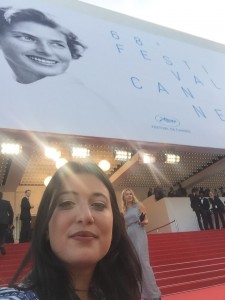This is the next in a series of posts by recipients of the Career Services Summer Funding grant. We’ve asked funding recipients to reflect on their summer experiences and talk about the industries in which they’ve been spending the summer. You can read the entire series here.
This entry is by Pauline Schreibmaier, COL ’16
 The 68th annual Cannes Film Festival began on May 13th 2015, providing its cinephile audiences with new films, ideas and directors, tourists with slight sightings of famous stars and beautiful weather, and businessmen with a market to buy and take home films to their native countries. On the outside, the festival appears to be one of enjoyment- a destination that provides a journey of pleasures and process of commodification for the 200,000 filmmakers, film fans, and stargazers alike to absorb. I am just one of the many people who wake up two hours before a screening to run into long lines, hoping to make it through 4 screenings in a day. I realize how much of a festival town Cannes is- the bus stations have photographs of actors, directors, and producers. Charlie Chaplin and Jacques Tati appear on walls, movie theaters line every block, and the face of the beautiful Ingrid Bergman appears in every store I pass. The restaurants stay open for hours on end, and La Croisette is filled with slow moving black cars holding everyone who is anyone.
The 68th annual Cannes Film Festival began on May 13th 2015, providing its cinephile audiences with new films, ideas and directors, tourists with slight sightings of famous stars and beautiful weather, and businessmen with a market to buy and take home films to their native countries. On the outside, the festival appears to be one of enjoyment- a destination that provides a journey of pleasures and process of commodification for the 200,000 filmmakers, film fans, and stargazers alike to absorb. I am just one of the many people who wake up two hours before a screening to run into long lines, hoping to make it through 4 screenings in a day. I realize how much of a festival town Cannes is- the bus stations have photographs of actors, directors, and producers. Charlie Chaplin and Jacques Tati appear on walls, movie theaters line every block, and the face of the beautiful Ingrid Bergman appears in every store I pass. The restaurants stay open for hours on end, and La Croisette is filled with slow moving black cars holding everyone who is anyone.
As I try to make my way through the multiple reporters, bicyclists, and tourists, I realize that the next 2 weeks are going to be some of the most of the most hectic, exhausting, and thrilling moments in my life as a film student. I watched documentaries, dramas, animated stories, but mostly movies that make you walk out of the theater, sad and distressed. Cannes sure makes you think and feel. Filmmakers from all over the world use their art to highlight social issues and captivate audiences while reflecting upon the international anxieties that lie in the human experience.
Apart from the 30 movies that I had the opportunity to watch, I noticed the peculiarity of the people around Cannes. I’m walking towards the beach and in the distance appear a little carnival with people on pedestals and clowns painting faces. There are half naked men running around, and crazies that are jumping out in front of cameras. A girl has hair down to her ankles and it has become increasingly hard to escape any of these people. Cannes is definitely alive and well. While standing in line for a screening, I take notice of the rather common Cannes specimen, the French Cinephile. This kind of woman always looks the same: a bit older than middle aged, often short and fit, with a nice straw like blonde bob, wearing khaki pants and a button down shirt. She is quite slow to her seat, but is easily angered when she does not get the one she wants. And if she does not like the movie she is seeing, has no problem leaving. If the festival allows for a short break in your day, people watching is definitely high up on the list.
Towards the end of the festival, you realize how special and important it is to watch films in a theater. Films were made to watch in an audience- to feel emotion alongside others, whether it is laughter, fear, or sadness. This is why Cannes was so great, overwhelming, and exhausting. We watched films with large amounts of people. Strangers. People who had opinions about what they were seeing. They would feel the sadness with me as you hear the sniffling in the background, and the booing from some disappointments. At the end of the day, Cannes is a business. And you learn that quickly. The festival is continually changing and doing new things to stir up commotion. These two weeks were incredibly eye opening and I only hope to come back within the next decade and experience something totally new and different. After all, film itself is a forever changing.


